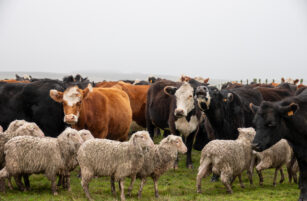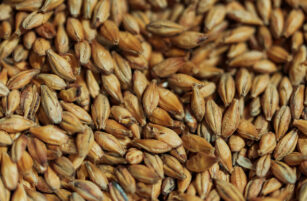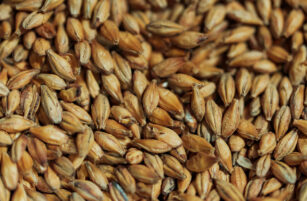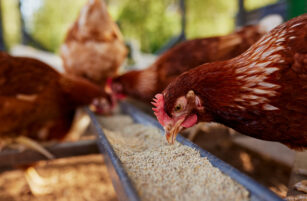Insight Focus
- EU accuses Russia of blackmail over grain exports
- Time may be running out to export Ukrainian grain
- India caps sugar exports
The headlines last week focussed on the mounting global food crisis, with Russia and the West blaming each other.
European Commission President Ursula von der Leyen told the World Economic Forum in Switzerland that Russia was using hunger and grain to wield power by confiscating grain stocks and plant machinery in Ukraine, blockading its Black Sea ports and bombarding grain storage facilities.
“And on top of this, Russia is now hoarding its own food exports as a form of blackmail — holding back supplies to increase global prices, or trading wheat in exchange for political support,” she added.
Kremlin spokesman Dmitry Peskov, however rejected her accusations and said the West was to blame for the global food shortage. Reuters quoted him as saying: “They (the West) must cancel those illegal decisions that prevent the chartering of ships, that prevent the export of grain, and so on.”
However, Russia is concerned about re-exports of its grain from members of the Eurasian Economic Union, an organisation of former Soviet republics, and wants all of them to impose quotas and duties on grain exports, Interfax reported.

Citing official media, the Associated Press reported that the Russian Defence Ministry had proposed a corridor to allow foreign ships to leave Black Sea ports and another to allow vessels to leave Mariupol on the Sea of Azov.
Mikhail Mizintsev, who heads Russia’s National Defence Control Center, said 70 foreign vessels from 16 countries are in six ports on the Black Sea, including Odesa, Kherson and Mykolaiv. He did not specify how many might be ready to carry food.
Ukraine expressed scepticism about the Russian proposal, AP said. Foreign Minister Dmytro Kuleba said his country was ready to agree on safe corridors in principle — but that it was not sure if it could trust Russia to abide by any agreement.
Turkey is also in negotiations with Russia and Ukraine to open a corridor via the Bosphorus for grain exports from Ukraine, a senior Turkish official told Reuters.
AP quoted the UN’s World Food Program’s spokesman, John Dumont, as saying it had been pushing to get wheat out of Ukrainian ports to help feed the hungry elsewhere in the world and avert growing food insecurity in vulnerable regions, while also making room for the harvest of grain that had recently been planted.
“It [grain] needs to get out in a continuous way. It cannot just be a little one-off humanitarian convoy. The Black Sea needs to open,” Dumont said.
A Ukrainian lawmaker warned that time was running out to get some 22 million tonnes of grain out of Ukraine ahead of the new harvest Yevheniia Kravchuk told Reuters.
“We have about maybe a month and a half before we start to collect the new harvest,” she said, adding there was not enough space to store the new crop.

Lithuania has received its first rail delivery of grain from Ukraine for onward shipment from Klaipeda port, Reuters quoted state-owned railway company LTG as saying.
“We expect to scale up to receiving a train per day from Ukraine, each with up to 1,500 tonnes of grain and other agricultural produce, for export via Klaipeda port,” LTG spokesman Mantas Dubauskas said.
Czech rail freight operator ĈD said it had sent the first train carrying 1,800 tonnes of corn from Ukraine to the German port of Brake. From there, the shipment continued by ship to Egypt.

In Egypt, the government said it had received around 3m tonnes of wheat from local farmers since the start of the harvest in early April, or around half the target for this year, Al-Ahram quoted Supply Minister Ali Moselhi as saying. Moselhi also said Egypt had enough wheat stocks to cover domestic consumption until January 2023.
The International Islamic Trade Finance Corp. will double Egypt’s credit limit to USD 6 billion to enable it to continue to make wheat purchases against the backdrop of soaring grain prices, Post Online Media reported.
Elsewhere in the Middle East, Iraq has much lower wheat reserves. Trade Ministry spokesman Mohamed Hanoun told the Al-Monitor website that the strategic wheat reserve is sufficient for only one month. He added that the ministry had secured “a stockpile of wheat and ration card commodities for a period of six months,” and that the government had allocated USD 1 billion to add 3 million tonnes of wheat to the strategic reserve. Local production of 50,000 tonnes a day would also increase the reserve, he said.
Mazhar Muhammad Salih, a financial adviser to Iraqi Prime Minister Mustafa al-Kadhimi, told Al-Monitor, “Iraq is dependent on Ukraine for 70-80% of its basic commodity import needs.” As a result, he said, the average food bill is expected to be 40% higher than in previous years.
In Kenya, industry bodies have warned of devastating maize and wheat shortage that could lead to a food crisis if the situation is not addressed, the Tuko website reported. Tuko said Kenya relies on imports for 96% of its wheat needs.

International Monetary Fund Managing Director Kristalina Georgieva told the BBC that while there was plenty of food, it was not evenly distributed.
She said the solutions were growing more crops where possible but also a greater focus on agricultural productivity, “not only because of the war, but because of climate change”.
“Trade needs to be retained open, we should not have a situation in which countries hold on to food more than they need and create all kinds of barriers for moving it from one place to another,” Georgieva added.
However, the Indian government decided to cap sugar exports at 10 million tonnes, the Indian Express reported to maintain domestic supply and price stability. On the other hand the government allowed the duty free import of 2 million tonnes a year each of soybean and sunflower oil in fiscal 2022-23 and 2023-24 (April-March) to temper prices, the Economic Times reported.














